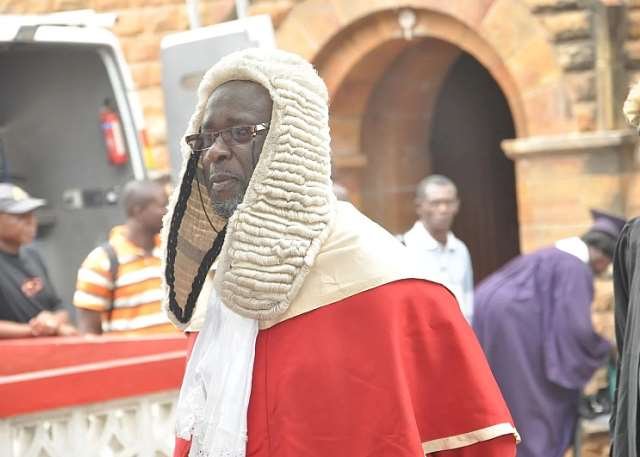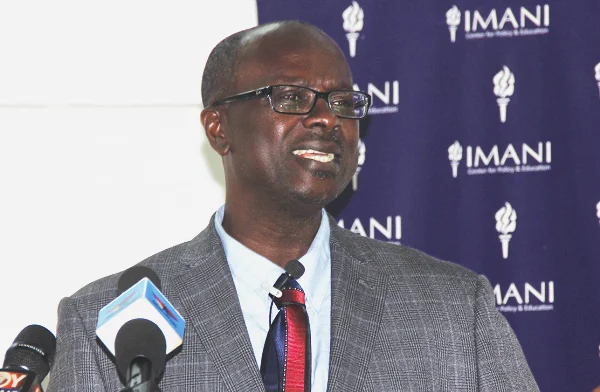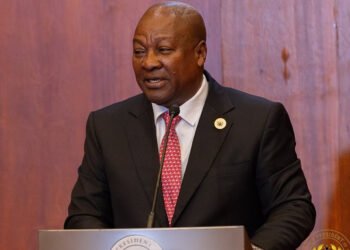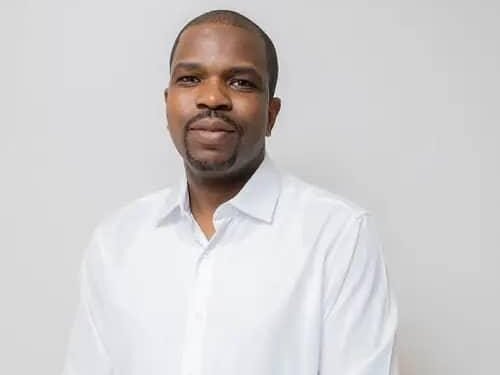Professor Stephen Kwaku Asare, a Fellow at the Ghana Centre for Democratic Development (CDD-Ghana) and respected legal scholar, has called for decisive reforms as Justice Paul Baffoe-Bonnie awaits parliamentary approval to become Ghana’s next Chief Justice.
In his view, the nomination presents both an opportunity and a test for the judiciary at a time when public confidence in the institution is at its lowest ebb in decades.
Justice Baffoe-Bonnie’s life story traces a path from rural beginnings to the country’s highest judicial office. Born in Goaso, he attended Local Authority primary and middle schools before continuing his education at Konongo Odumase Secondary School, where he obtained both O-Level and A-Level certificates.
He later enrolled at the University of Ghana, Legon, to study law. It was at Legon that he shared a room at Sarbah Hall with the late Kwadwo Owusu Afriyie, popularly known as Sir John, while also forming a friendship with future Chief Justice Anin Yeboah, a member of Commonwealth Hall.
The three described themselves as the “trio of village law students,” a reminder, as Justice Baffoe-Bonnie himself once noted, that Ghana’s highest judicial offices are not reserved for the privileged.
From these humble beginnings, he rose through every rank of the judiciary. He began his career as a Circuit Court Judge in Duayaw Nkwanta before serving as a High Court Judge in Kumasi. His rise continued with appointments to the Court of Appeal and later the Supreme Court, elevations made by former President John Agyekum Kufuor in 2006 and 2008, respectively.

Moment of Crisis
Despite this long service, Justice Baffoe-Bonnie’s nomination comes at what Professor Asare described as a “moment of crisis.” Citizens, he argued, view the judiciary as a system beset with case backlogs, arbitrary transfers of judges, opaque empanelment practices, and what many perceive as excessive ties to the executive arm of government.
“Public trust in the judiciary is at an all-time low,” he warned. At nearly 69 years old, Justice Baffoe-Bonnie has less than two years before mandatory retirement. This reality, according to Professor Asare, presents him with a stark choice: either pursue a bold legacy of reform or quietly manage the institution until his exit.
In outlining what he believes should define the nominee’s tenure, Professor Asare presented ten reform proposals that, if implemented, could restore the country’s judiciary’s credibility and efficiency. These recommendations, drawn from his long-standing advocacy for judicial accountability, address structural weaknesses that, in his assessment, have eroded confidence in Ghana’s courts.
Fixing the Judiciary with Bold Reforms
One of his key proposals is the abolition of long legal vacations. He argued that the practice of extended breaks undermines access to justice, suggesting instead that judges should take staggered leave so that courts remain functional throughout the year.
“Justice should no longer be denied by delays,” he insisted, adding that strict timelines for the progression of cases should be adopted through collaboration with the Rules of Court Committee.
Professor Asare also stressed the importance of fairness in the assignment and transfer of cases. He called for the introduction of a secure, digital system to randomly assign cases to judges, thereby reducing perceptions of bias.
Transfers, he added, should be governed by transparent criteria such as workload, expertise, or promotion, with administrative staff handling the process under the Chief Justice’s supervision.

Another proposal centers on constitutional cases, which he said must be decided by a full bench of nine justices, in line with what he described as the Wiredu Directive. Such a measure, he argued, would protect the legitimacy and consistency of constitutional interpretation.
Professor Asare also urged reforms in the area of interlocutory appeals. He suggested adopting a “final judgment rule” to prevent abuse of piecemeal appeals, which often prolong proceedings and frustrate litigants.
Alongside this, he advocated the creation of a free, searchable, and continuously updated database of case law, statutes, and regulations to improve public access to legal materials.
He further emphasized the need for plain language in legal processes. According to him, Supreme Court judgments should include short, public-friendly summaries of no more than two pages, while pleadings and rulings should replace archaic formulations with simple, modern English.
He gave the example of replacing the cumbersome “Save as hereinbefore expressly admitted…” with the straightforward “Except where specifically admitted, the defendant denies all other allegations.”
Calls for Performance Audits and Modernization
Performance audits also formed part of his reform ideas. He proposed regular reviews of judges and court registries, focusing on timeliness, integrity, and case management, with results published annually. He stressed that any regulations or directives from the Chief Justice must comply strictly with Article 159 of the Constitution, cautioning against issuing directives by fiat.
To address inefficiencies, Professor Asare urged the modernization of court systems through technology, such as e-filing, electronic service of process, and virtual hearings. This, he argued, would help reduce costs for litigants and ease longstanding backlogs.
Finally, he called for a stronger ethics and accountability framework. The Judicial Council, he said, should be empowered to swiftly address misconduct while safeguarding judicial independence. Judges, he suggested, should undergo continuous training not only in ethics but also in areas such as human rights, case management, technology, and financial crimes.

Professor Asare concluded by stressing that the reforms he outlined were not exhaustive but represented an urgent action plan that could help rebuild the judiciary. “If confirmed by Parliament, Justice Baffoe-Bonnie has a historic opportunity to reverse decline and restore credibility,” he stated.
He also left a pointed reminder: “Above all, remember that you are the Chief Justice of the people, not the President’s judge.” Justice Baffoe-Bonnie’s nomination may signal continuity in one sense, but, as Professor Asare observed, the deeper question is whether he will seize the chance to implement reforms that restore public trust.
With less than two years in office, the stakes are high, and his decisions will determine whether his legacy is defined by quiet stewardship or bold transformation.
READ ALSO: Ghana Joins ECOWAS Push to Revamp 0.5% Import Levy Amid Cash Crunch






















